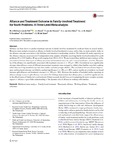Alliance and Treatment Outcome in Family-Involved Treatment for Youth Problems: A Three-Level Meta-analysis

Use este enlace para citar
http://hdl.handle.net/2183/38485Colecciones
- Investigación (FEP) [507]
Metadatos
Mostrar el registro completo del ítemTítulo
Alliance and Treatment Outcome in Family-Involved Treatment for Youth Problems: A Three-Level Meta-analysisAutor(es)
Fecha
2018-06Cita bibliográfica
Welmers-van de Poll, M.J., Roest, J.J., van der Stouwe, T. et al. Alliance and Treatment Outcome in Family-Involved Treatment for Youth Problems: A Three-Level Meta-analysis. Clin Child Fam Psychol Rev 21, 146–170 (2018). https://doi.org/10.1007/s10567-017-0249-y
Resumen
[Abstract] Alliance has been shown to predict treatment outcome in family-involved treatment for youth problems in several studies. However, meta-analytic research on alliance in family-involved treatment is scarce, and to date, no meta-analytic study on the alliance-outcome association in this field has paid attention to moderating variables. We included 28 studies reporting on the alliance-outcome association in 21 independent study samples of families receiving family-involved treatment for youth problems (N = 2126 families, M age youth ranging from 10.6 to 16.1). We performed three multilevel meta-analyses of the associations between three types of alliance processes and treatment outcome, and of several moderator variables. The quality of the alliance was significantly associated with treatment outcome (r = .183, p < .001). Correlations were significantly stronger when alliance scores of different measurement moments were averaged or added, when families were help-seeking rather than receiving mandated care and when studies included younger children. The correlation between alliance improvement and treatment outcome just failed to reached significance (r = .281, p = .067), and no significant correlation was found between split alliances and treatment outcome (r = .106, p = .343). However, the number of included studies reporting on alliance change scores or split alliances was small. Our findings demonstrate that alliance plays a small but significant role in the effectiveness of family-involved treatment. Future research should focus on investigating the more complex systemic aspects of alliance to gain fuller understanding of the dynamic role of alliance in working with families.
Palabras clave
Family-based treatment
Multilevel meta-analysis
Therapeutic alliance
Treatment outcomes
Working alliance
Multilevel meta-analysis
Therapeutic alliance
Treatment outcomes
Working alliance
Versión del editor
Derechos
Atribución 3.0 España






